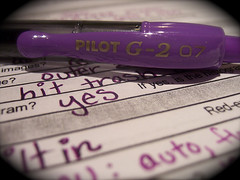
近几年来,认知科学家已证实了“考试效应”(或测验效应)的现象,即参加测试,而非经过学习,也能增强个人对考试内容的记忆。《科学》杂志每日新闻报道了华盛顿大学心理学博士生Jason Chan及其同事的研究结论:突击测验可以增强记忆力,甚至可能超过学习的功效。对于那些一想到突击测验就冒冷汗的学生来讲,这篇或许是个好消息,当然也可能是个更坏的消息——一位加拿大教授正准备每堂课前都进行突击测验。-psytopic.com
《科学》杂志每日新闻11月13日报道,发表在本期《实验心理学期刊:总论》的一项研究显示,突击测验可增强记忆力,甚至可能超过学习的功效。这对于那些一想到突击测验就冒冷汗的学生来讲,或许是个好消息。而且,新研究还显示,测验也有助于学生记住最初不在试卷上的内容。
该研究由在密苏里州圣路易斯的华盛顿大学心理学博士生Jason Chan及其同事开展,他们很想知道测验是否也影响对未考内容的记忆。近几年来,认知科学家已证实了一种名为“测验/考试效应”的现象,即参加测试,而非经过学习,可以增强个人之后对考试内容的记忆。
为了验证这一理论,研究小组招募了84位心理学专业的在校大学生,让他们阅读一篇本专业所不熟悉的巨嘴鸟方面的文章。读完后,由三分之一学生离开,三分之一学生被要求再读一篇额外文章,涉及内容与之前一样。另三分之一被要求对所看文章进行一个简答测试。第二天,所有的受试者都回来参加一项最终的简答测试,其中包括前一天的小测试里的问题,也有新问题。
实验结果表明:前一天参加过测试的学生比没参加的另外两组学生,得分平均高出8%。同样,前一天测验中出现过的问题再考,比文章中从未见过的题目得分率高。
Chan说道,实验结果提示参加测验可以提高相关但未考过的内容。“如果一个班的学生只做了一半测验,他们对另一半的记忆力也不并非‘触手可及’,也未被激活。”这就提示学期测验可能会提高学生在总期末考试的成绩。虽然研究未对可能机制进行探讨,作者暗示:当一个人读测验问题的时候,可能会不由自主地想到相关信息。对相关信息的追忆可能增强了对其的记忆,这有利于以后够获取到这一信息。
威斯康辛大学-麦迪逊分校教育心理学专家Mitchell Nathan说,“这样讲听起来像是在推崇题海战术的好处。而加拿大卑诗省维多利亚大学认知心理学家Steve Lindsay则称,测验效应的证据很有说服力,因此他现在正准备每堂课都要对前一天的课堂内容进行个突击测验。
Testing Boosts Memory
Students who break into a cold sweat at the thought of a pop quiz might feel better once they learn about a side effect of test-taking: The practice appears to enhance memory, possibly even more than studying. What's more, according to a new study, testing also helps students remember material that wasn't on the exam in the first place.
Over the past several years, cognitive scientists have documented a phenomenon called the "testing effect," in which taking a test, rather than studying, boosts an individual's ability to remember the material later on. The research led psychology doctoral student Jason Chan and his colleagues at Washington University in St. Louis, Missouri, to wonder whether testing also affects memory for untested materials.
To test the theory, the team had 84 undergraduate students read a passage about toucans, a topic the researchers believed would be unfamiliar to psychology undergraduates. After reading the passage, one-third of the students were dismissed, one-third were asked to read an additional set of study materials that covered the same information as the original passage, and one-third were asked to take a brief short-answer test on the original material. The next day, all participants returned to take a final short-answer test, which included questions from the previous day's brief test as well as new questions.
1. Students who took the test the day before scored, on average, 8% higher on the second-day test than did the two groups of students who did not take the initial test.This pattern held true for test questions repeated from the previous day's test well as for questions about toucans the students had never seen before, the team reports today in the Journal of Experimental Psychology: General.
2. The experiments suggest that taking a test improves memory of related but untested material, says Chan. "If students take a test on only half of the materials in a class, their memory of the other half is not just laying around and not being activated," he says,Suggesting several tests over a semester might improve students' performance on a final exam. While the study did not explore a possible mechanism, the authors suggest that when people read a test question, they may automatically think of related information. Retrieving the related information may enhance their memory of it, helping them to access that information at a later time.
"This sounds like the kind of thing that would be very beneficial to introduce to classroom practices," says Mitchell Nathan, an educational psychologist at the University of Wisconsin, Madison. Indeed, cognitive psychologist Steve Lindsay of the University of Victoria in British Columbia, Canada, says that evidence for the testing effect is compelling enough that he now begins every class with a pop quiz of the previous day's lecture material.
By Jennifer Cutraro
来源:ScienceNOW Daily News/VIA:丁香园
No comments:
Post a Comment